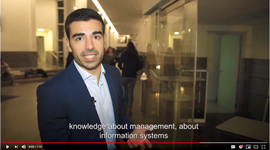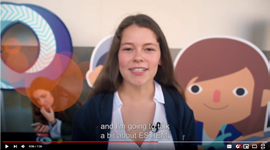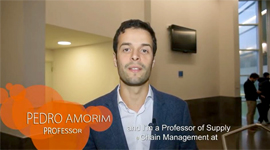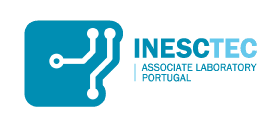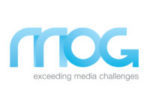
ABOUT THIS PROGRAMME

What is the Master in Multimedia?
The Master in Multimedia is an academic degree course aimed at students and professionals from multiple areas of knowledge who seek to solve the challenges of an increasingly competitive global market and improve creative skills through a strong theoretical, scientific, and technological base.

Who is this master’s degree for?
Candidates trained in the areas of Communication Sciences, Visual Arts, Economics and Management, Communication Technology, Education, Sound Technology and Music with special interest in the area of Creation and Technological Development.
DURATION
2 years.
STRUCTURE
This Master has a contribution from 5 Faculties of the Universidade do Porto:

SPECIALIZATIONS
The existence of a teaching staff composed of elements from five faculties suitable for the plan of dissertations and multidisciplinary and interdisciplinary research, generating specific training offers in four specializations:

STUDY PLAN
The study plan for the Master in Multimedia follows the expressed principles of the Bologna Process, taking into account the global objectives and the pedagogical changes resulting from it.
GENERAL OBJECTIVES
Allow graduates the skills of competencies applicable to the new media, enhancing an individual culture assimilated by each student, and encouraging the sharing of distinct knowledge between work teams through courses and workshops.
SPECIFICS OBJECTIVES
- Provide technical-scientific training and a practical and theoretical basis for the design, development, and realization of projects, products, processes, and services in Multimedia Technology.
- Encourage the development of non-technical skills, creative characteristics, and attitudes, as well as critical reflection, teamwork, and a spirit of leadership.
- Encourage creativity, initiative, and the acquisition of an entrepreneurial spirit with regard to the assessment of scenarios, risks, and seizing opportunities.
ACCREDITATIONS
The Master in Multimedia is accredited by the Higher Education Assessment and Accreditation Agency (A3ES). More information can be found in the reports produced by A3ES

Professional Opportunities
The Master in Multimedia provides a wide range of professional opportunities related to Digital Media:

The course opens up opportunities for careers in emerging areas such as:



PORTFÓLIO

Cooperation with Companies
The dissertation, held in the second year of the Master in Multimedia, takes place in research units as well as in partnership with the business environment. This partnership is consolidated in the frequent participation of companies in seminars for master students, collaborative work developed throughout the course, and in the exploration of real case studies in the classroom.
The institutions where students have done their dissertations in recent years include:

ERASMUS MOBILITY
ERASMUS + is the European education, training and youth program that aims to promote cooperation at the international level, both for a period of studies and for a period of internship.
The Mobility Studies OUT and the Apprenticeships OUT work through the establishment of bilateral agreements between institutions, constituting partnerships that agree on the mobility of students, teachers, and researchers on a reciprocal basis. The experience of international mobility offers the possibility to explore knowledge through different perspectives and to contact with very different cultures and customs, broadening horizons and enriching journeys through unique experiences.

Groups and Associations
NECGM Student Group
NeCGM is formed by a group of students with interests in different areas: Computer Science – Game Development – Multimedia. Its objective is to promote the development of Games (Digital, VR and AR) – Apps – 3D Models and Renderers, and the organization of events such as Game Dev Meets – Global Game Jam – Workshops – Showcases.

5 reasons to choose the U.Porto MM

Academic path enriched by contact with professors from five faculties, from different areas, and colleagues with very different backgrounds and nationalities.

It offers four specializations, with the possibility for students to seek their own path, obtaining a diversified training and adjusted to their needs.

Obtaining solid training in Multimedia Technologies for the conception, design, and realization of products, processes, and services, in a creative way.

Career opportunities in emerging areas such as Transmedia Storytelling, User Experience Design, Interactive Media, Digital (Serious) Games, Virtual and Augmented Reality, Interactive Music Production, and Sound Design.

Acquisition of skills and attitudes necessary for the successful execution of multidisciplinary projects, required in professional contexts, enhancing successful professional or academic careers.

TESTEMUNIALS

CURRICULAR PLAN


Culture and Art Specialization
Ability to understand the articulations of contemporary media, information technology, and design for cultural and artistic production, recognizing spaces of opportunity for the development of new practices, methodologies, or media.
Coordinator: Prof. Pedro Cardoso

Education Specialization
Ability to understand information technologies and design for the production of multimedia materials for application in educational contexts and in the use of advanced means of communication to dynamize learning communities.
Coordinator: Prof. Carla Morais

Interactive Technologies and Digital Games Specialization
Ability to design and implement multimedia systems and applications and to innovate in the design of new products based on emerging technologies.
Coordinator: Prof. Teresa Andrade

Interactive Music and Sound Design Specilization
Ability to develop advanced work in the area of interactive musical systems, including design, creation, and operation of these systems in various application contexts, including games, interactive installations, cinema, and other audiovisual media.
Coordinator: Prof. Gilberto Bernardes

SCHEDULE
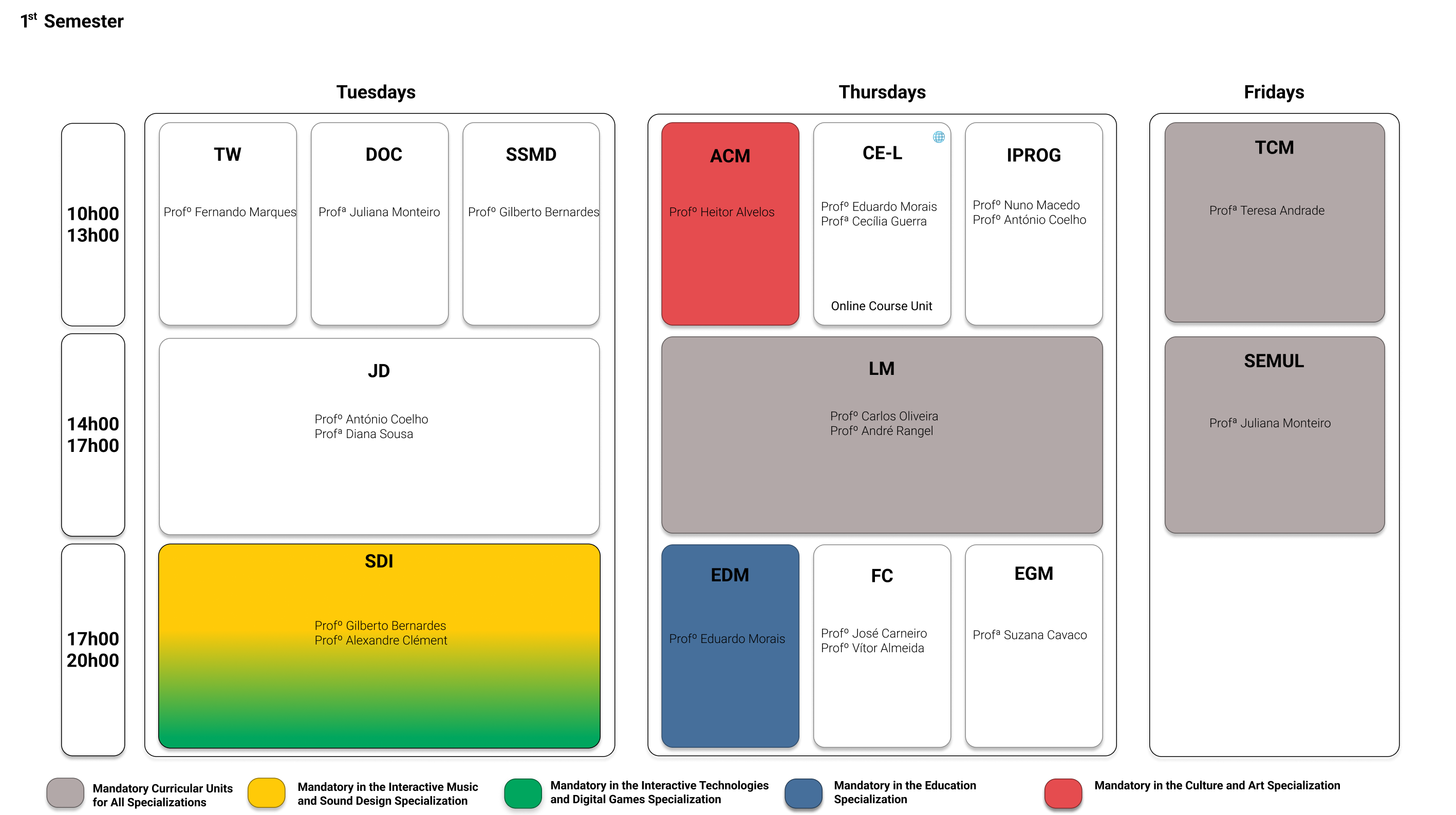
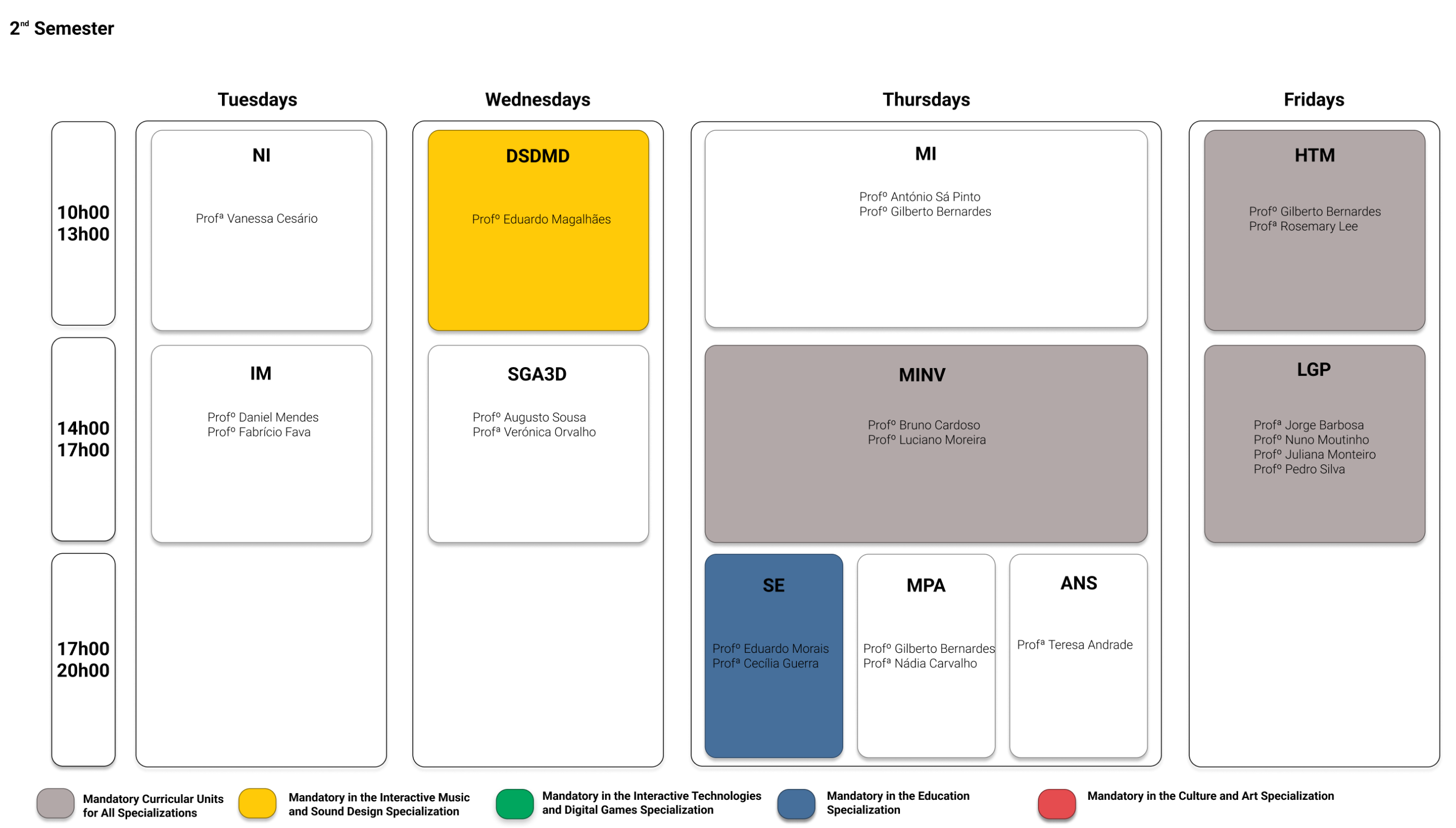

CONTACTS
Faculdade de Engenharia da Universidade do Porto
Departamento de Engenharia Informática
Rua Dr. Roberto Frias, s/n
4200-465 Porto
Secretariat
Simão Cunha
+351 220 413 904
mmult@fe.up.pt

Directors, Scientific Committee and Programme Follow-Up Committee

JORGE BARBOSA | FEUP
DIRECTOR
SCIENTIFIC COMMITTEE AND PROGRAMME FOLLOW-UP COMMITTEE
ASSOCIATE PROFESSOR

TERESA ANDRADE | FEUP
ASSISTANT DIRECTOR
SCIENTIFIC COMMITTEE
ASSISTANT PROFESSOR

CARLA MORAIS | FCUP
SCIENTIFIC COMMITTEE
ASSISTANT PROFESSOR

PEDRO CARDOSO | FBAUP
SCIENTIFIC COMMITTEE
ASSISTANT PROFESSOR

HELENA LIMA | FLUP
SCIENTIFIC COMMITTEE
ASSOCIATE PROFESSOR

SUZANA CAVACO | FEP
SCIENTIFIC COMMITTEE
ASSISTANT PROFESSOR

ANTÓNIO COELHO | FEUP
PROGRAMME FOLLOW-UP COMMITTEEE
ASSOCIATE PROFESSOR
TO BE ELECTED
PROGRAMME FOLLOW-UP COMMITTEE
STUDENT
TO BE ELECTED
PROGRAMME FOLLOW-UP COMMITTEE
STUDENT
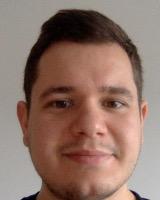
SIMÃO CUNHA
SECRETARIAT

FAQ
Take a look at the contacts page. The secretariat is usually the best place to start for general questions.
Holders of Degree or equivalent (national or foreign), or holders of academic, scientific or professional curriculum recognized by the scientific committee as attesting the capacity to attend this program.
- Arts and Culture: Provides skills to understand the articulations of contemporary media, information technology, and design for cultural and artistic production, recognizing areas of opportunity for the development of new practices, methods or media.
- Education: Provides skills to understand information technology and design for the production of multimedia materials for use in educational contexts and the use of advanced means of communication for the promotion of learning communities.
- Interactive Music and Sound Design: Provides skills to develop advanced work in the area of interactive musical systems, including design, creation, and operation of these systems in various application contexts, including (but not limited to) games, interactive installations and other applications. Develops the ability to develop advanced work in the area of sound design for film or other audio-visual solutions, as well as digital games.
- Technologies: Provides skills to design and implement systems and multimedia applications and to innovate in the design of new products, processes and services based on emerging technologies.
- Total of five classes (courses) per week in the first and second semester, two classes in the third semester
- Each class three hours long
- Classes are distributed through Tuesday, Thursday and Friday, in slots starting at 9:30, 14:00, and 17:00 (distribution depends on selected specialization and electives)
- D document (ID Card / Citizen Card / Passport) (mandatory);
- Graduation Certificate from a higher education programme (mandatory);
- In the 2nd phase and subsequent phases of applications, if you have already graduated but are unable to produce the Graduation Certificate, then you must submit a written statement indicating the graduation date and the final grade you are expected to achieve.
- You are still be required to provide the Graduation Certificate before enrollment;
- For qualifications obtained abroad see note (1);
- Certificate listing all the Higher Education courses completed, their duration (semester/year), and number of credit units/ECTS (required);
- If you cannot obtain a certificate containing this information, you should add a list of courses completed, providing the information requested (mandatory);
- You are still be required to provide the Certificate before enrollment;
- UP students are only required to scan and attach the “Percurso Académico” information;
- For qualifications obtained abroad see note (1);
- Curriculum vitae (mandatory);
- Recommendation Letters (optional);
- Photo (optional) (“passport-style” in color, preferably with a neutral background, 200 pixels tall by 140 pixels wide, JPG format, average quality or higher);
- Dissertation/research topic proposal (mandatory).
- The student should propose one or more research topics to develop as her/his dissertation.
- It should be presented succinctly (max. 5 pages) including the motivation, a set of goals, and a brief description of how the student intends to develop it and which are the major skills already acquired and to be developed during the master programme.
- Make sure you check the additional information about the project proposal
- Motivation Letter (mandatory)
- PDF, maximum one page, indication why you are interested in the course, and what are your expectations.
- Portfolio (mandatory)
- Portfolio of projects and works developed in academic, personal, and professional settings, related to the area
- Additional documentation
- The application web page (available here) should be checked for any additional documentation required.
- (1) Notes for Applicants from foreign higher education:
- For qualifications obtained abroad you will be required to produce an original document in either Portuguese, English, French, or Spanish, duly signed and certified by the respective institution’s highest academic body.
- If the document is not in one of the above mentioned languages then it must be authenticated by the official education authorities of the respective country and recognized by the Portuguese consular or diplomatic authorities.
- Alternatively, it must hold the Apostille of the Hague Convention. The same should happen with regard to translations of documents whose original language is not Portuguese, Spanish, French or English.
The tuition fee may vary on a yearly basis, regardless of the value . For the current year you can find info here.
For details on the individual courses per specialization, visit the specializations pages.
- The first and second semesters have five courses each, some are common to all specializations, some are specialization specific, and some are elective.
- In the third semester, there are two elective courses, in parallel with the dissertation (which is annual, spanning the third and the fourth semester)
- The fourth semester is fully devoted to the dissertation, which has to be submitted during June and defended in July.
Concluded thesis can be seen here. (some recent ones may be unavailable yet).




